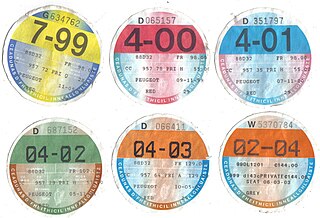 W
WTaxation in the Republic of Ireland in 2017 came from Personal Income taxes, and Consumption taxes, being VAT and Excise and Customs duties. Corporation taxes represents most of the balance, but Ireland's Corporate Tax System (CT) is a central part of Ireland's economic model. Ireland summarises its taxation policy using the OECD's Hierarchy of Taxes pyramid, which emphasises high corporate tax rates as the most harmful types of taxes where economic growth is the objective. The balance of Ireland's taxes are Property taxes and Capital taxes.
 W
WIreland's Corporate Tax System is a central component of Ireland's economy. In 2016–17, foreign firms paid 80% of Irish corporate tax, employed 25% of the Irish labour force, and created 57% of Irish OECD non-farm value-add. As of 2017, 25 of the top 50 Irish firms were U.S.–controlled businesses, representing 70% of the revenue of the top 50 Irish firms. By 2018, Ireland had received the most U.S. § Corporate tax inversions in history, and Apple was over one–fifth of Irish GDP. Academics rank Ireland as the largest tax haven; larger than the Caribbean tax haven system.
 W
WThe Double Irish was a base erosion and profit shifting (BEPS) corporate tax tool used mostly by US multinationals since the late 1980s to avoid corporate taxation on non-U.S. profits. It was the largest tax avoidance tool in history and by 2010 was shielding US$100 billion annually in US multinational foreign profits from taxation, and was the main tool by which US multinationals built up untaxed offshore reserves of US$1 trillion from 2004 to 2018. Traditionally, it was also used with the Dutch Sandwich BEPS tool; however, changes to Irish tax law in 2010 dispensed with this requirement.
 W
WOn 29 August 2016, after a two-year investigation, Margrethe Vestager of the European Commission announced: "Ireland granted illegal tax benefits to Apple". The Commission ordered Apple to pay €13 billion, plus interest, in unpaid Irish taxes from 2004–14 to the Irish state. It was the largest corporate tax "fine" in history. On 7 September 2016, the Irish State secured a majority in Dáil Éireann to reject payment of the back-taxes, which including penalties could reach €20 billion, or 10% of 2014 Irish GDP. In November 2016, the Irish government formally appealed the ruling, claiming there was no violation of Irish tax law, and that the commission's action was "an intrusion into Irish sovereignty", as national tax policy is excluded from EU treaties. In November 2016, Apple CEO Tim Cook, announced Apple would appeal, and in September 2018, Apple lodged €13 billion to an escrow account, pending appeal. In July 2020, the European General Court struck down EU tax decision as illegal, ruling in favor of Apple.
 W
WIreland has been labelled a tax haven or corporate tax haven in multiple reports, an allegation which the state rejects. Ireland is on all academic "tax haven lists", including the § Leaders in tax haven research, and tax NGOs. Ireland does not meet the 1998 OECD definition of a tax haven, but no OECD member, including Switzerland, ever met this definition; only Trinidad & Tobago met it in 2017. Similarly, no EU–28 country is amongst the 64 listed in the 2017 EU tax haven blacklist and greylist. In September 2016, Brazil became the first G20 country to "blacklist" Ireland as a tax haven.
 W
WAn Irish Section 110 special purpose vehicle (SPV) or section 110 company, is an Irish tax resident company, which qualifies under Section 110 of the Irish Taxes Consolidation Act 1997 (TCA) for a special tax regime that enables the SPV to attain "tax neutrality": i.e. the SPV pays no Irish taxes, VAT, or duties.
 W
WLeprechaun economics is a satirical term coined by economist Paul Krugman to describe the 26.3 per cent rise in Irish 2015 GDP, later revised to 34.4 per cent, in a 12 July 2016 publication by the Irish Central Statistics Office (CSO), restating 2015 Irish national accounts. At that point, the historical distortion of Irish economic data by tax-driven accounting flows reached a climax. By 2020, Krugman said the term was a feature of all tax havens.
 W
WMatheson, is an Irish law firm partnership based in the IFSC in Dublin, which specialises in multinational tax schemes, and tax structuring of special purpose vehicles. Matheson is estimated to be Ireland's largest corporate law firm. Matheson state in the International Tax Review that their tax department is: "significantly the largest tax practice group amongst Irish law firms".
 W
WModified gross national income, Modified GNI or GNI* was created by the Central Bank of Ireland in February 2017 as a new way to measure the Irish economy, and Irish indebtedness, due to the increasing distortion that the base erosion and profit shifting ("BEPS") tools of US multinational tax schemes were having on Irish GNP and Irish GDP; the climax being the July 2016 leprechaun economics affair with Apple Inc.
 W
WMotor Tax is an annual duty payable on motor vehicles in Ireland for use in public places. A new system for new private cars was introduced on 1 July 2008 where the tax rates are based on the carbon dioxide emissions of the car while in operation. Prior to this, tax rates are assessed on engine displacement - this includes used imports first registered in their original country of sale before July 2008. Motorcycles are all taxed the same regardless of engine displacement, with a special rate for electrically powered cycles. For goods vehicles, commercial vehicles and PSVs it is based on weight or is a standardised fee. For taxation of cars with Wankel engines under the old size-based system, the actual engine displacement is multiplied by 1.5 so for example a Mazda RX-8 with a 1.3 litre rotary engine is taxed as a 1.8 litre engined vehicle.
 W
WFeargal O'Rourke is an Irish accountant and corporate tax expert, who is the managing partner of PwC in Ireland. He is considered the architect of the Double Irish tax scheme used by U.S. firms such as Apple, Google and Facebook in Ireland, and a leader in the development of corporate tax planning tools, and tax legislation, for U.S. multinationals in Ireland.
 W
WQualifying Investor Alternative Investment Fund or QIAIF is a Central Bank of Ireland regulatory classification established in 2013 for Ireland's five tax-free legal structures for holding assets. The Irish Collective Asset-management Vehicle or ICAV is the most popular of the five Irish QIAIF structures, and was designed in 2014 to rival the Cayman Island SPC; it is the main tax-free structure for foreign investors holding Irish assets.